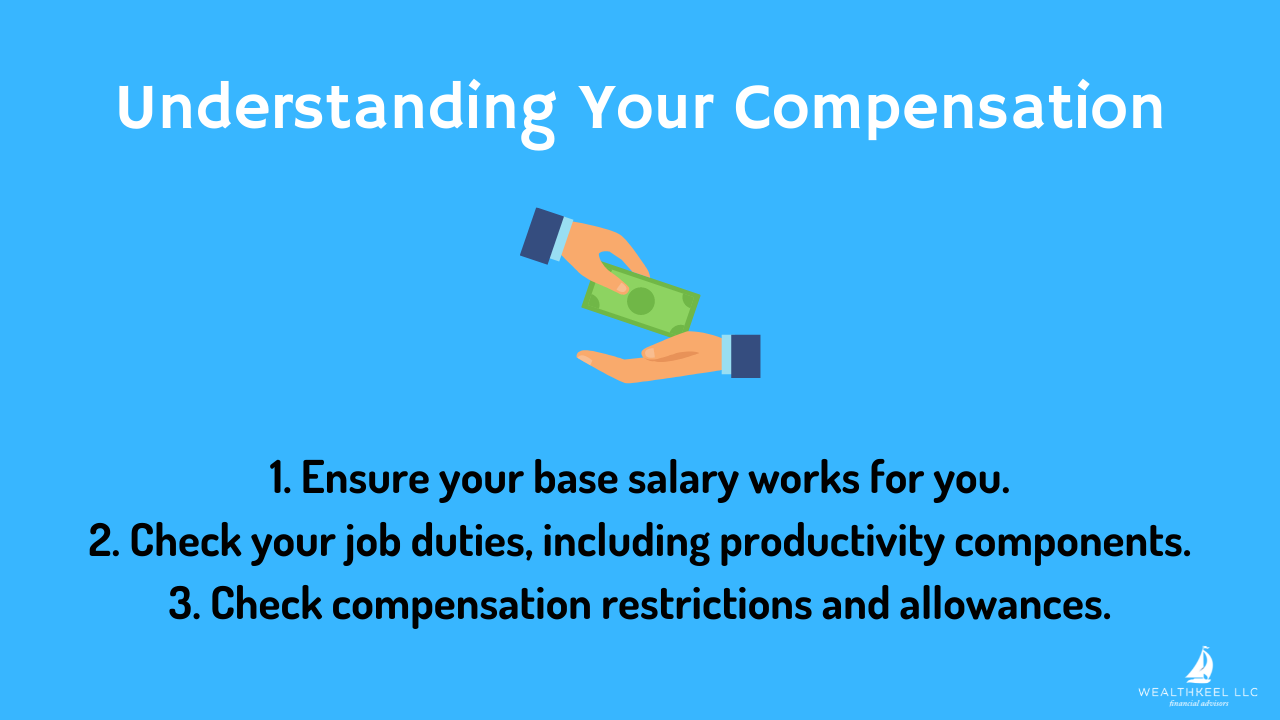Whether you’re starting your first position as an attending physician or you’re changing jobs part way through your career, every physician must know how to review their employment contract topics. It’s a given that your employer will set up a contract in a way that stacks the odds in their favor.
However, if you’re able to read through the contract and make sure it matches your personal and professional needs, you’ll be able to start your new job with peace of mind. If, for some reason, you find that there’s a piece of your contract that doesn’t match what you want or need out of this role, you’ll be able to negotiate from a place of confidence before signing on the dotted line.
These seven topics are critical components of your employment contract and have the potential to impact you and your family for years to come.
KEY TAKEAWAYS:
- Know what obligations your employer expects from you so that neither you nor your employer has misunderstood expectations.
- Sometimes a physician’s salary isn’t a straightforward number that’s earned through static job duties. Check to see how your compensation is earned.
- Figure out your compensation term so you know how long you’re signing on to work with your employer in this particular role. A very important add-on to this is to know if there’s an opportunity to increase your earnings in this period!
- Check on your employer’s defined terms and negotiate as necessary. This is an easy one to skip over, but it’s so important!
- Figure out your nice-to-have and need-to-have fringe benefits and negotiate them accordingly. And don’t overlook the non-compete!
Prefer video over the blog? We got you covered! Watch our YouTube video as we dissect this blog post for you.
Know Your Obligations
Your obligations, or conditions of employment, should outline everything your new employer expects of you. Think of these as your job responsibilities. Unfortunately, many physicians make the mistake of assuming they know what’s expected of them.
Then, they’re surprised when they’re asked to do more without compensation or when reviews don’t go as well as planned due to a perceived lack of performance by their employer. Understanding what job duties you are responsible for is critical.
For example, some physicians are responsible for limited duties, including patient appointment hours, hospital rounds, and emergency room calls. However, most physicians will be expected to take on additional duties and responsibilities.
These might include, but certainly aren’t limited to:
- Office duties and paperwork
- Reviewing lab results and blood work
- Taking (and responding to) phone calls
- Consultations
- Documenting medical records
- Education and training
- Peer reviews
Understand How Compensation is Set Up
Salary negotiations are something that the majority of professionals will face at some point in their careers. However, physician compensation can be especially complex. Of course, start by digging into your base salary. This number needs to be enough to cover all of your family’s basic expenses and then some. You want enough wiggle room to start working toward savings and debt repayment goals, all while still being able to enjoy your life.
Check to see how your compensation is earned. In many cases, a physician’s salary isn’t a straightforward number that’s earned through static job duties. Instead, employers are now incorporating a productivity component in compensation. Productivity usually correlates with how much clinical care you’re providing.
If there is a productivity stipulation as part of your compensation, you want to make sure that your other job responsibilities won’t dramatically cut into your ability to provide clinical care. Administrative duties or time spent on training new colleagues could harm your ability to earn. Finally, it’s important to look at other types of compensation restrictions or allowances. For example, many employers will offer a bonus plan that’s written in a way that makes it difficult for employees to earn an incentive bonus. You want to know the exact way incentive plans are calculated and whether there are any stipulations (like waiting for a site to “break-even” before paying out incentive plans).
What’s Your Contract Term?
Your employer may write in a contract term.
In short, your contract term defines how long the contract is expected to last, whether or not it can be renewed, and what terms need to be met for renewal.
Unfortunately, these contract terms are often much longer than physicians anticipate.
It’s important to know how long you’re signing on to work with this specific employer within this role, and whether or not there are ways to increase your earnings during that time frame. For example, you don’t want to work somewhere for 5+ years without any opportunity for a cost of living or salary increase based on performance incentives.
Check Defined Terms
In your contract, you may see certain terms either bolded or italicized. Typically, these are “defined terms” and will have written definitions at the end of your contract. It’s easy to skip looking over this section, but it’s important! Take a look at some of these frequently-used defined terms:
|
Defined Term |
Definition |
|
Evergreen provision |
This provision often means that, after your contract term is up, the contract will stay intact year-to-year. |
|
Without cause |
If your employer can terminate your contract “without cause,” they don’t need a clear reason to let you go. You could be an ideal employee, and they can still terminate your contract. Your best bet here is to negotiate for more notice so that, if they choose to terminate, you have plenty of time to find a new role. |
|
Sole discretion |
This indicates that your employer can modify the terms of your employment contract at any time, without your consent. |
|
Waiver |
A waiver provision at the end of your contract gives your employer the flexibility to adjust previously agreed upon terms – like work hours. |
|
Assignment |
This prohibits you from assigning your contract to someone else. |
|
Controlling law |
This puts your contract under the “controlling law” of the state where your employer is headquartered. It’s especially important to note this if your employer is headquartered in a state other than the one in which you work. |
|
Professional misconduct |
Your employer may have a unique definition of professional misconduct that could result in termination. Know exactly what’s expected of you (and what “misconduct” means with this employer) to stay in good standing. |
Are Fringe Benefits Available?
Salary and bonus structure are both important. However, fringe benefits are an equally critical component of your contract. Be on the lookout for benefits that you and your family either need or want. This might include:
- Student loan reimbursement
- Continuing education opportunities
- Vacation and sick leave
- Insurance (life, disability, health)
- Relocation expenses
- Retirement plan options
- Maternity leave
- Gym membership options
- Discounted local services
Some fringe benefits are a “nice to have” while others are a “need to have.” For example, insurance and time off should both be a clear part of your contract, whereas a gym membership or loan reimbursement might just be the icing on the cake.
What Are the Implications of the Termination Provisions?
Do you know what could lead to a termination of your contract? Ideally, your contract will outline termination provisions that benefit both you and the employer. For example, your employer may be able to terminate your contract “at will” with notice, and you may be able to terminate your contract after your contract term is up with notice, as well.
That being said, there are times when employers write termination provisions that lean heavily in their favor. Some employers can terminate contracts with their physicians for the following causes:
- Illness and disability
- Breach of contract
- License suspension
- Professional misconduct
In some cases, employers don’t even need a reason to terminate your contract. Ideally, in these situations, you should seek professional legal advice to negotiate stipulations in the contract that makes it easy for you to recover if the contract is unexpectedly terminated. This might look like severance pay or a longer contract termination notice.
Is There a Non-Compete In Place?
Non-competes are often the source of a physician’s frustration as they look to make the next move in their career. Too often, when you first get hired, you view your employer through rose-colored glasses. Both you and your employer are entering into this arrangement with the expectation that your employment with them will be long-term and beneficial for both parties.
When you start to consider another position either due to burnout, an exciting new opportunity, or just because your existing employer isn’t everything you thought they’d be — a non-compete can get in your way.
Usually, a non-compete will be set up to last a set amount of time (either years or months), have a geographic location, and offer specific exceptions. So, your non-compete could potentially say that you’re unable to work for a competing employer for two years within your state unless you’ve decided to take a position in education or as a medical director (not a practitioner).
It’s possible to fight a non-compete, but the legal battle that will ensue is both expensive and time-consuming. Instead, do the legwork on the front-end to figure out what stipulations your non-compete has and whether they’re either negotiable, or whether you can plan your career accordingly.
Don’t Go At It Alone
Your employment contract is, without a doubt, one of the number one things that could positively or negatively impact your life and your finances. In the near future, the terms of your contract will dictate your lifestyle and workplace fulfillment. In the distant future, your employment contract could impact your earning potential, your ability to grow your career, and so much more.
Regardless of whether this is your first-ever employment contract or your fifth, it’s important to seek legal counsel when evaluating the terms you’re signing up for. Reaching out to a lawyer or a professional who works with physicians can help you to determine whether or not the contract is written in a way that positively impacts you — or whether you need to negotiate.
I don’t care what the partners or human resources tell you about this being a “standard contract,” hire an attorney to review the contract.
More importantly, if you can find an attorney who has read that same contract numerous times, he or she can be on the lookout for different income and bonus structures.
A few possible options for Contract Reviews from The White Coat Investor. Read the excellent guest post from Dennis Hursh (a recommended attorney from The White Coat Investor); The 3 Biggest Traps in Physician Employment Agreements.
Looking for a more thorough, all-in-one spot for your financial life? Check out our free eBook: A Doctor’s Prescription to Comprehensive Financial Wellness [Yes, it will ask for your email 😉]
Disclosures


